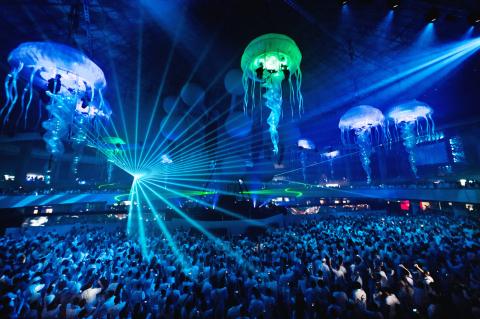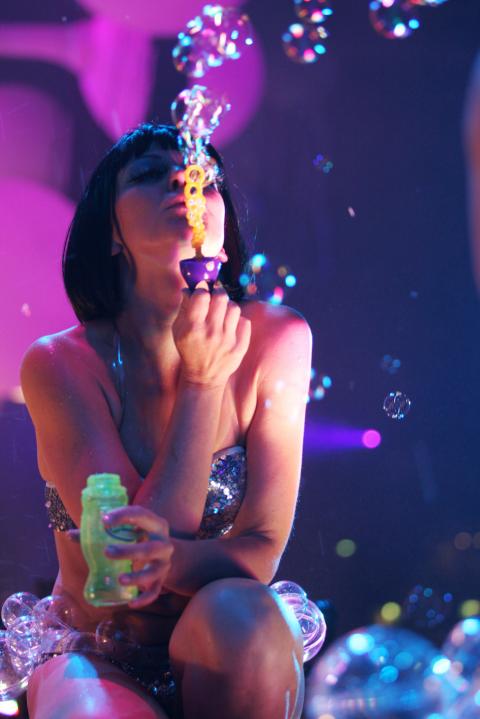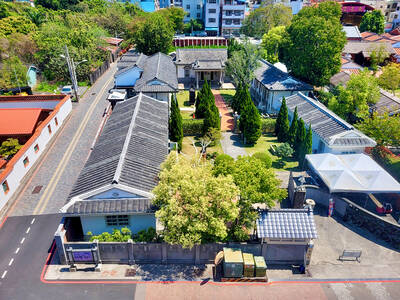European party circuit Sensation will appear in Kaohsiung this weekend to host one of the world’s biggest raves for 15,000 revelers. It’s the show’s third and final stop for its debut Asian tour.
The sold-out event promises to transform Kaohsiung Arena (高雄巨蛋) into an ocean of white, with a mandatory all-white dress code, larger-than-life decorations and an elaborate stage all designed with an oceanic theme. Looking at photos from past events, however, Sensation seems more of a circus than a rave.
The Sensation Web site describes the event as a “world of nocturnal sea life with acrobats shooting over the ceiling, giant jellyfish hovering above the dance floor and DJs that guide you through the uncharted waters of mesmerizing grooves and melodies.”

Photo Courtesy of theLOOP
“There definitely is never-seen-before surprises at this event,” said David Hsia (夏天浩), co-founder of theLOOP and one of Sensation’s partners.
The event was announced last spring but the DJ line-up wasn’t released until recently, and musical aficionados will be delighted to know that the A-list DJ line up includes Fedde Le Grand, Sebastien Leger, 2000 and One, Sunnery James & Ryan Marciano and Sensation resident Mr. White. But, Hsia said, the focus of the event remains on Sensation itself.
While house and techno music will energize the event, there is more in store than just dancing. “Every Sensation event has a special 20-minute show that is the spirit of the brand,” said Hsia. “During this period, there will be no DJ, and the music is pre-recorded in a mega-mix style so that every piece of equipment onsite will be choreographed according to the mix. It’s a truly spectacular show which people will never forget.”

Photo Courtesy of theLOOP
Intrigued? Though sold out, tickets are popping up on Yahoo auctions and on Sensation White Facebook. Or, you can always try your luck with scalpers. Fortunately, there is always next year as Hsia says Sensation is expected to be an annual event.
Doors at K-Arena open at 9pm tomorrow night, only an hour before countdown. Instructions posted on the Sensation Facebook event will help partygoers avoid traffic and ensure there are no problems with entry or getting drinks. The event is expected to run until 5am. For more information, visit: www.sensation.com/taiwan

Photo Courtesy of theLOOP

April 28 to May 4 During the Japanese colonial era, a city’s “first” high school typically served Japanese students, while Taiwanese attended the “second” high school. Only in Taichung was this reversed. That’s because when Taichung First High School opened its doors on May 1, 1915 to serve Taiwanese students who were previously barred from secondary education, it was the only high school in town. Former principal Hideo Azukisawa threatened to quit when the government in 1922 attempted to transfer the “first” designation to a new local high school for Japanese students, leading to this unusual situation. Prior to the Taichung First

Chinese Nationalist Party (KMT) Chairman Eric Chu (朱立倫) hatched a bold plan to charge forward and seize the initiative when he held a protest in front of the Taipei City Prosecutors’ Office. Though risky, because illegal, its success would help tackle at least six problems facing both himself and the KMT. What he did not see coming was Taipei Mayor Chiang Wan-an (將萬安) tripping him up out of the gate. In spite of Chu being the most consequential and successful KMT chairman since the early 2010s — arguably saving the party from financial ruin and restoring its electoral viability —

The Ministry of Education last month proposed a nationwide ban on mobile devices in schools, aiming to curb concerns over student phone addiction. Under the revised regulation, which will take effect in August, teachers and schools will be required to collect mobile devices — including phones, laptops and wearables devices — for safekeeping during school hours, unless they are being used for educational purposes. For Chang Fong-ching (張鳳琴), the ban will have a positive impact. “It’s a good move,” says the professor in the department of

Toward the outside edge of Taichung City, in Wufeng District (霧峰去), sits a sprawling collection of single-story buildings with tiled roofs belonging to the Wufeng Lin (霧峰林家) family, who rose to prominence through success in military, commercial, and artistic endeavors in the 19th century. Most of these buildings have brick walls and tiled roofs in the traditional reddish-brown color, but in the middle is one incongruous property with bright white walls and a black tiled roof: Yipu Garden (頤圃). Purists may scoff at the Japanese-style exterior and its radical departure from the Fujianese architectural style of the surrounding buildings. However, the property